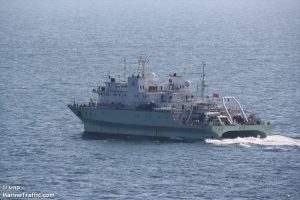An Indian Navy warship was involved in ejecting a Chinese marine research vessel operating in India’s exclusive economic zone (EEZ) in November, according to Indian reports citing official sources.
According to a report by India Today TV, a Chinese research ship, the Shi Yan 1, was “spotted carrying out research activities near Port Blair when it was asked to leave the Indian waters by an Indian Navy frontline warship.”
Port Blair is the capital of the Indian union territory of the Andaman and Nicobar Islands, which also hosts a major Indian naval base, INS Jarawa. Port Blair also hosts the only integrated tri-command of the Indian military, bringing together the Indian Army, Air Force, and Navy.
“The Chinese vessel was camped in the Indian waters west of Port Blair and carrying out research activities at length,” the report added. The vessel apparently appeared suspicious to Indian authorities, who believed “the vessel could have been used to monitor all underwater and surface vessels of the Indian Navy stationed in the region.”
According to the United Nations Convention on the Law of the Sea (UNCLOS), foreign states are permitted to conduct marine research activities within a coastal state’s EEZ with prior consent. It appears that the Shi Yan 1 was conducting activities that would have required Indian consent within the EEZ. UNCLOS also provides that under “normal circumstances“ coastal states are expected to grant consent for maritime research activities in their EEZs.
It‘s unclear if Chinese authorities made any request to India for the Shi Yan 1’s operations. Under Article 252 UNCLOS, a convention that both India and China have ratified, foreign states can conduct marine scientific research within a coastal state‘s EEZ if no reply is received to a request to conduct such activity within six months. This “implied consent“ provision allows for research activities compliant with the convention.
India, in general, along with China, does not permit foreign states to conduct surveillance activities within its EEZ. By contrast, states like the United States assert a right to conduct surveillance activities in the EEZ. (The United States has not ratified UNCLOS.)
Part V of UNCLOS defines EEZs as an area that “shall not extend beyond 200 nautical miles from the baselines from which the breadth of the territorial sea is measured.”
According to the convention, coastal states have “sovereign rights” in their EEZs “for the purpose of exploring and exploiting, conserving and managing the natural resources, whether living or non-living, of the waters superjacent to the seabed and of the seabed and its subsoil, and with regard to other activities for the economic exploitation and exploration of the zone, such as the production of energy from the water, currents and winds.“
Indian authorities have in recent years expressed concerns about growing Chinese maritime operations—including naval operations—in the Indian Ocean Region, perceiving it as a strategic challenge.

































